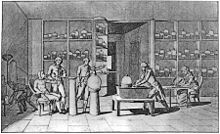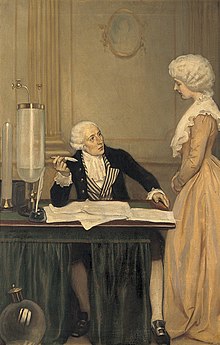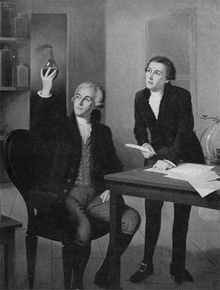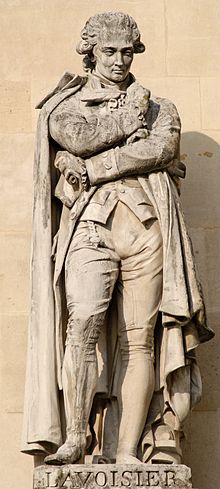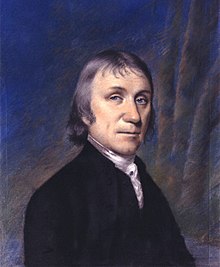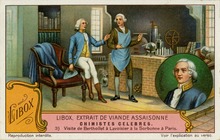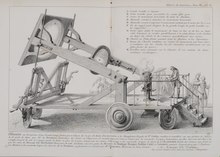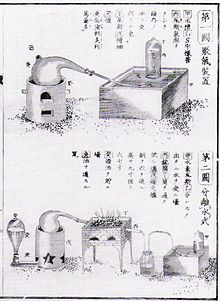Antoine-Laurent de Lavoisier
| |
|---|---|
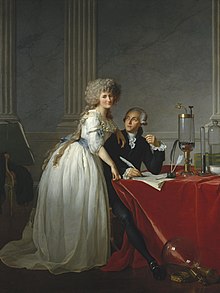
Portrait of Antoine-Laurent de Lavoisier and his wife, chemist Marie-Anne Pierrette Paulze by Jacques-Louis David
| |
| Born | 26 August 1743 |
| Died | 8 May 1794 (aged 50)
Paris, France
|
| Cause of death | Execution by guillotine |
| Resting place | Catacombs of Paris |
| Alma mater | Collège des Quatre-Nations, University of Paris |
| Known for |
|
| Scientific career | |
| Fields | Biologist, chemist |
| Notable students | Éleuthère Irénée du Pont |
| Influences | Guillaume-François Rouelle, Étienne Condillac |
| Signature | |
 | |
Antoine-Laurent de Lavoisier (also Antoine Lavoisier after the French Revolution; French: [ɑ̃twan lɔʁɑ̃ də lavwazje]; 26 August 1743 – 8 May 1794) was a French nobleman and chemist who was central to the 18th-century chemical revolution and who had a large influence on both the history of chemistry and the history of biology. He is widely considered in popular literature as the "father of modern chemistry".
It is generally accepted that Lavoisier's great accomplishments in chemistry stem largely from his changing the science from a qualitative to a quantitative one. Lavoisier is most noted for his discovery of the role oxygen plays in combustion. He recognized and named oxygen (1778) and hydrogen (1783), and opposed the phlogiston theory. Lavoisier helped construct the metric system, wrote the first extensive list of elements, and helped to reform chemical nomenclature. He predicted the existence of silicon (1787) and was also the first to establish that sulfur was an element (1777) rather than a compound. He discovered that, although matter may change its form or shape, its mass always remains the same.
Lavoisier was a powerful member of a number of aristocratic councils, and an administrator of the Ferme générale. The Ferme générale was one of the most hated components of the Ancien Régime because of the profits it took at the expense of the state, the secrecy of the terms of its contracts, and the violence of its armed agents. All of these political and economic activities enabled him to fund his scientific research. At the height of the French Revolution, he was charged with tax fraud and selling adulterated tobacco, and was guillotined.
Biography
The Collège des Quatre-Nations in Paris
Early life and education
Antoine-Laurent Lavoisier was born to a wealthy family of the nobility in Paris on 26 August 1743. The son of an attorney at the Parlement of Paris, he inherited a large fortune at the age of five upon the death of his mother. Lavoisier began his schooling at the Collège des Quatre-Nations, University of Paris
(also known as the Collège Mazarin) in Paris in 1754 at the age of 11.
In his last two years (1760–1761) at the school, his scientific
interests were aroused, and he studied chemistry, botany, astronomy, and mathematics. In the philosophy class he came under the tutelage of Abbé Nicolas Louis de Lacaille,
a distinguished mathematician and observational astronomer who imbued
the young Lavoisier with an interest in meteorological observation, an
enthusiasm which never left him. Lavoisier entered the school of law,
where he received a bachelor's degree in 1763 and a licentiate in 1764.
Lavoisier received a law degree and was admitted to the bar, but never practiced as a lawyer. However, he continued his scientific education in his spare time.
Early scientific work
Lavoisier's education was filled with the ideals of the French Enlightenment of the time, and he was fascinated by Pierre Macquer's
dictionary of chemistry. He attended lectures in the natural sciences.
Lavoisier's devotion and passion for chemistry were largely influenced
by Étienne Condillac,
a prominent French scholar of the 18th century. His first chemical
publication appeared in 1764. From 1763 to 1767, he studied geology
under Jean-Étienne Guettard. In collaboration with Guettard, Lavoisier worked on a geological survey of Alsace-Lorraine in June 1767. In 1764 he read his first paper to the French Academy of Sciences, France's most elite scientific society, on the chemical and physical properties of gypsum (hydrated calcium sulfate), and in 1766 he was awarded a gold medal by the King for an essay on the problems of urban street lighting. In 1768 Lavoisier received a provisional appointment to the Academy of Sciences. In 1769, he worked on the first geological map of France.
Lavoisier as a social reformer
Lavoisier conducting an experiment on respiration in the 1770s
Research benefitting the public good
While Lavoisier is commonly known for his contributions to the
sciences, he also dedicated a significant portion of his fortune and
work toward benefitting the public.
Lavoisier was a humanitarian—he cared deeply about the people in his
country and often concerned himself with improving the livelihood of the
population by agriculture, industry, and the sciences. The first instance of this occurred in 1765, when he submitted an essay on improving urban street lighting to the French Academy of Sciences.
Three years later in 1768, he focused on a new project to design an aqueduct. The goal was to bring water from the river Yvette
into Paris so that the citizens could have clean drinking water. But,
since the construction never commenced, he instead turned his focus to
purifying the water from the Seine. This was the project that interested
Lavoisier in the chemistry of water and public sanitation duties.
He additionally was interested in air quality, and spent some
time studying the health risks associated with gunpowder's effect on the
air.
In 1772, he performed a study on how to reconstruct the Hôtel-Dieu
hospital, after it had been damaged by fire, in a way that would allow
proper ventilation and clean air throughout.
At the time, the prisons in Paris were known to be largely unlivable and the prisoners' treatment inhumane.
Lavoisier took part in investigations in 1780 (and again in 1791) on
the hygiene in prisons and had made suggestions to improve living
conditions, suggestions which were largely ignored.
Once a part of the Academy, Lavoisier also held his own
competitions to push the direction of research towards bettering the
public and his own work. One such project he proposed in 1793 was to better public health on the "insalubrious arts".
Sponsorship of the sciences
Lavoisier had a vision of public education having roots in "scientific sociability" and philanthropy.
Lavoisier gained a vast majority of his income through buying stock in the General Farm,
which allowed him to work on science full-time, live comfortably, and
allowed him to contribute financially to better the community. (It would also contribute to his demise during the Reign of Terror many years later.)
It was very difficult to secure public funding for the sciences
at the time, and additionally not very financially profitable for the
average scientist, so Lavoisier used his wealth to open a very expensive
and sophisticated laboratory in France so that aspiring scientists
could study without the barriers of securing funding for their research.
He also pushed for public education in the sciences. He founded two organizations, Lycée [fr] and Musée des Arts et Métiers,
which were created to serve as educational tools for the public. Funded
by the wealthy and noble, the Lycée regularly taught courses to the
public beginning in 1793.
Ferme générale and marriage
Portrait of Lavoisier explaining to his wife the result of his experiments on air by Ernest Board
At the age of 26, around the time he was elected to the Academy of Sciences, Lavoisier bought a share in the Ferme générale, a tax farming
financial company which advanced the estimated tax revenue to the royal
government in return for the right to collect the taxes. On behalf of
the Ferme générale Lavoisier commissioned the building of a wall around Paris so that customs duties could be collected from those transporting goods into and out of the city. His participation in the collection of its taxes did not help his reputation when the Reign of Terror began in France, as taxes and poor government reform were the primary motivators during the French Revolution.
Lavoisier consolidated his social and economic position when, in 1771 at age 28, he married Marie-Anne Pierrette Paulze, the 13-year-old daughter of a senior member of the Ferme générale.
She was to play an important part in Lavoisier's scientific
career—notably, she translated English documents for him, including Richard Kirwan's Essay on Phlogiston and Joseph Priestley's
research. In addition, she assisted him in the laboratory and created
many sketches and carved engravings of the laboratory instruments used
by Lavoisier and his colleagues for their scientific works. Madame
Lavoisier edited and published Antoine's memoirs (whether any English
translations of those memoirs have survived is unknown as of today) and
hosted parties at which eminent scientists discussed ideas and problems
related to chemistry.
A portrait of Antoine and Marie-Anne Lavoisier was painted by the famed artist Jacques-Louis David. Completed in 1788 on the eve of the Revolution, the painting was denied a customary public display at the Paris Salon for fear that it might inflame anti-aristocratic passions.
For three years following his entry into the Ferme générale, Lavoisier's scientific activity diminished somewhat, for much of his time was taken up with official Ferme générale
business. He did, however, present one important memoir to the Academy
of Sciences during this period, on the supposed conversion of water into
earth by evaporation. By a very precise quantitative experiment
Lavoisier showed that the "earthy" sediment produced after
long-continued reflux heating of water in a glass vessel was not due to a
conversion of the water into earth but rather to the gradual
disintegration of the inside of the glass vessel produced by the boiling
water. He also attempted to introduce reforms in the French monetary and taxation system to help the peasants.
Adulteration of tobacco
The Farmers General held a monopoly of the production, import and
sale of tobacco in France, and the taxes they levied on tobacco brought
revenues of 30 million livres
a year. This revenue began to fall because of a growing black market in
tobacco that was smuggled and adulterated, most commonly with ash and
water. Lavoisier devised a method of checking whether ash had been mixed
in with tobacco: "When a spirit of vitriol, aqua fortis
or some other acid solution is poured on ash, there is an immediate
very intense effervescent reaction, accompanied by an easily detected
noise." Lavoisier also noticed that the addition of a small amount of
ash improved the flavour of tobacco. Of one vendor selling adulterated
goods he wrote "His tobacco enjoys a very good reputation in the
province... the very small proportion of ash that is added gives it a
particularly pungent flavour that consumers look for. Perhaps the Farm
could gain some advantage by adding a bit of this liquid mixture when
the tobacco is fabricated." Lavoisier also found that while adding a lot
of water to bulk the tobacco up would cause it to ferment and smell
bad, the addition of a very small amount improved the product.
Thereafter the factories of the Farmers General added, as he
recommended, a consistent 6.3% of water by volume to the tobacco they
processed. To allow for this addition, the Farmers General delivered to retailers seventeen ounces of tobacco while only charging for sixteen.
To ensure that only these authorised amounts were added, and to exclude
the black market, Lavoisier saw to it that a watertight system of
checks, accounts, supervision and testing made it very difficult for
retailers to source contraband tobacco or to improve their profits by
bulking it up. He was energetic and rigorous in implementing this, and
the systems he introduced were deeply unpopular with the tobacco
retailers across the country. This unpopularity was to have consequences
for him during the French Revolution.
Royal Commission on Agriculture
Lavoisier urged the establishment of a Royal Commission on
Agriculture. He then served as its Secretary and spent considerable sums
of his own money in order to improve the agricultural yields in the Sologne,
an area where farmland was of poor quality. The humidity of the region
often led to a blight of the rye harvest, causing outbreaks of ergotism
among the population. In 1788 Lavoisier presented a report to the
Commission detailing ten years of efforts on his experimental farm to
introduce new crops and types of livestock. His conclusion was that
despite the possibilities of agricultural reforms, the tax system left
tenant farmers with so little that it was unrealistic to expect them to
change their traditional practices.
Gunpowder Commission
Éleuthère Irénée du Pont (right) and mentor Antoine Lavoisier
Lavoisier's researches on combustion were carried out in the midst of
a very busy schedule of public and private duties, especially in
connection with the Ferme Générale. There were also innumerable
reports for and committees of the Academy of Sciences to investigate
specific problems on order of the royal government. Lavoisier, whose
organizing skills were outstanding, frequently landed the task of
writing up such official reports. In 1775 he was made one of four
commissioners of gunpowder appointed to replace a private company,
similar to the Ferme Générale, which had proved unsatisfactory in
supplying France with its munitions requirements. As a result of his
efforts, both the quantity and quality of French gunpowder
greatly improved, and it became a source of revenue for the government.
His appointment to the Gunpowder Commission brought one great benefit
to Lavoisier's scientific career as well. As a commissioner, he enjoyed
both a house and a laboratory in the Royal Arsenal. Here he lived and
worked between 1775 and 1792.
Lavoisier was a formative influence in the formation of the Du Pont gunpowder business because he trained Éleuthère Irénée du Pont,
its founder, on gunpowder-making in France; the latter said that the Du
Pont gunpowder mills "would never have been started but for his
kindness to me."
During the Revolution
In June 1791 Lavoisier made a loan of 71,000 livres to Pierre Samuel du Pont de Nemours to buy a printing works so that du Pont could publish a newspaper, La Correspondance Patriotique. The plan was for this to include both reports of debates in the National Constituent Assembly as well as papers from the Academy of Sciences. The revolution quickly disrupted the elder du Pont's first newspaper, but his son E.I. du Pont soon launched Le Republicain and published Lavoisier's latest chemistry texts. Lavoisier also chaired the commission set up to establish a uniform system of weights and measures which in March 1791 recommended the adoption of the metric system. The new system of weights and measures was adopted by the Convention on 1 August 1793.
Lavoisier himself was removed from the commission on weights and
measures on 23 December 1793, together with Laplace and several other
members, for political reasons. One of his last major works was a proposal to the National Convention
for the reform of French education. He also intervened on behalf of a
number of foreign-born scientists including mathematician Joseph Louis Lagrange, helping to exempt them from a mandate stripping all foreigners of possessions and freedom.
Final days and execution
Lavoisier, by Jacques-Léonard Maillet, ca 1853, among culture heroes in the Louvre's Cour Napoléon
As the French Revolution gained momentum, attacks mounted on the deeply unpopular Ferme générale, and it was eventually abolished in March 1791.
In 1792 Lavoisier was forced to resign from his post on the Gunpowder
Commission and to move from his house and laboratory at the Royal
Arsenal. On 8 August 1793, all the learned societies, including the
Academy of Sciences, were suppressed at the request of Abbé Grégoire.
On 24 November 1793, the arrest of all the former tax farmers was
ordered. Lavoisier and the other Farmers General faced nine accusations
of defrauding the state of money owed to it, and of adding water to
tobacco before selling it. Lavoisier drafted their defence, refuting the
financial accusations, reminding the court of how they had maintained a
consistently high quality of tobacco. The court was however inclined to
believe that by condemning them and seizing their goods, it would
recover huge sums for the state. Lavoisier was convicted and guillotined on 8 May 1794 in Paris, at the age of 50, along with his 27 co-defendants.
According to a (probably apocryphal) story, the appeal to spare
his life so that he could continue his experiments was cut short by the
judge, Coffinhal: "La République n'a pas besoin de savants ni de chimistes; le cours de la justice ne peut être suspendu." ("The Republic has no need of scientists or chemists; the course of justice cannot be delayed.")
Lavoisier was convicted with summary justice of having plundered the
people and the treasury of France, of having adulterated the nation's
tobacco with water, and of having supplied the enemies of France with
huge sums of money from the national treasury.
Lavoisier's importance to science was expressed by Lagrange who lamented the beheading by saying: "Il
ne leur a fallu qu'un moment pour faire tomber cette tête, et cent
années peut-être ne suffiront pas pour en reproduire une semblable." ("It took them only an instant to cut off this head, and one hundred years might not suffice to reproduce its like.")
Post-mortem
A year and a half after his death, Lavoisier was exonerated by the French government. During the White Terror,
his belongings were delivered to his widow. A brief note was included,
reading "To the widow of Lavoisier, who was falsely convicted".
About a century after his death, a statue of Lavoisier was
erected in Paris. It was later discovered that the sculptor had not
actually copied Lavoisier's head for the statue, but used a spare head
of the Marquis de Condorcet, the Secretary of the Academy of Sciences during Lavoisier's last years.
Lack of money prevented alterations from being made. The statue was
melted down during the Second World War and has not been replaced. One
of the main "lycées" (high schools) in Paris and a street in the 8th arrondissement are named after Lavoisier, and statues of him are found on the Hôtel de Ville and on the façade of the Cour Napoléon of the Louvre. His name is one of the 72 names of eminent French scientists, engineers and mathematicians inscribed on the Eiffel Tower as well as on buildings around Killian Court at MIT in Cambridge, MA.
Contributions to chemistry
Oxygen theory of combustion
Antoine Lavoisier's phlogiston experiment. Engraving by Mme Lavoisier in the 1780s taken from Traité élémentaire de chimie (Elementary treatise on chemistry)
During late 1772 Lavoisier turned his attention to the phenomenon of combustion,
the topic on which he was to make his most significant contribution to
science. He reported the results of his first experiments on combustion
in a note to the Academy on 20 October, in which he reported that when phosphorus burned, it combined with a large quantity of air to produce acid spirit of phosphorus,
and that the phosphorus increased in weight on burning. In a second
sealed note deposited with the Academy a few weeks later (1 November)
Lavoisier extended his observations and conclusions to the burning of sulfur
and went on to add that "what is observed in the combustion of sulfur
and phosphorus may well take place in the case of all substances that
gain in weight by combustion and calcination: and I am persuaded that
the increase in weight of metallic calces is due to the same cause."
Joseph Black's "fixed air"
During 1773 Lavoisier determined to review thoroughly the literature
on air, particularly "fixed air," and to repeat many of the experiments
of other workers in the field. He published an account of this review in
1774 in a book entitled Opuscules physiques et chimiques (Physical and Chemical Essays). In the course of this review he made his first full study of the work of Joseph Black,
the Scottish chemist who had carried out a series of classic
quantitative experiments on the mild and caustic alkalies. Black had
shown that the difference between a mild alkali, for example, chalk (CaCO3), and the caustic form, for example, quicklime (CaO),
lay in the fact that the former contained "fixed air," not common air
fixed in the chalk, but a distinct chemical species, now understood to
be carbon dioxide (CO2),
which was a constituent of the atmosphere. Lavoisier recognized that
Black's fixed air was identical with the air evolved when metal calces
were reduced with charcoal and even suggested that the air which
combined with metals on calcination and increased the weight might be
Black's fixed air, that is, CO2.
Joseph Priestley
Joseph Priestley, an English chemist known for isolating oxygen, which he termed "dephlogisticated air"
In the spring of 1774 Lavoisier carried out experiments on the
calcination of tin and lead in sealed vessels, the results of which
conclusively confirmed that the increase in weight of metals in
combustion was due to combination with air. But the question remained
about whether it was combination with common atmospheric air or with
only a part of atmospheric air. In October the English chemist Joseph Priestley visited Paris, where he met Lavoisier and told him of the air which he had produced by heating the red calx of mercury
with a burning glass and which had supported combustion with extreme
vigor. Priestley at this time was unsure of the nature of this gas, but
he felt that it was an especially pure form of common air. Lavoisier
carried out his own researches on this peculiar substance. The result
was his memoir On the Nature of the Principle Which Combines with Metals during Their Calcination and Increases Their Weight,
read to the Academy on 26 April 1775 (commonly referred to as the
Easter Memoir). In the original memoir Lavoisier showed that the mercury
calx was a true metallic calx in that it could be reduced with charcoal, giving off Black's fixed air in the process.
When reduced without charcoal, it gave off an air which supported
respiration and combustion in an enhanced way. He concluded that this
was just a pure form of common air, and that it was the air itself
"undivided, without alteration, without decomposition" which combined
with metals on calcination.
After returning from Paris, Priestley took up once again his
investigation of the air from mercury calx. His results now showed that
this air was not just an especially pure form of common air but was
"five or six times better than common air, for the purpose of
respiration, inflammation, and ... every other use of common air." He
called the air dephlogisticated air, as he thought it was common air
deprived of its phlogiston. Since it was therefore in a state to absorb a
much greater quantity of phlogiston given off by burning bodies and
respiring animals, the greatly enhanced combustion of substances and the
greater ease of breathing in this air were explained.
Pioneer of stoichiometry
Lavoisier's researches included some of the first truly quantitative chemical experiments. He carefully weighed the reactants and products of a chemical reaction in a sealed glass vessel so that no gases could escape, which was a crucial step in the advancement of chemistry.
In 1774, he showed that, although matter can change its state in a
chemical reaction, the total mass of matter is the same at the end as at
the beginning of every chemical change. Thus, for instance, if a piece
of wood is burned to ashes, the total mass remains unchanged if gaseous
reactants and products are included. Lavoisier's experiments supported
the law of conservation of mass. In France it is taught as Lavoisier's Law and is paraphrased from a statement in his "Traité Élémentaire de Chimie" to "Rien ne se perd, rien ne se crée, tout se transforme." ("Nothing is lost, nothing is created, everything is transformed."). Mikhail Lomonosov
(1711–1765) had previously expressed similar ideas in 1748 and proved
them in experiments; others whose ideas pre-date the work of Lavoisier
include Jean Rey (1583–1645), Joseph Black (1728–1799), and Henry Cavendish (1731–1810).
Chemical nomenclature
Lavoisier, together with Louis-Bernard Guyton de Morveau, Claude-Louis Berthollet, and Antoine François de Fourcroy, submitted a new program for the reforms of chemical nomenclature to the Academy in 1787, for there was virtually no rational system of chemical nomenclature at this time. This work, titled Méthode de nomenclature chimique (Method of Chemical Nomenclature, 1787), introduced a new system which was tied inextricably to Lavoisier's new oxygen theory of chemistry. The Classical elements
of earth, air, fire, and water were discarded, and instead some 55
substances which could not be decomposed into simpler substances by any
known chemical means were provisionally listed as elements. The elements
included light; caloric (matter of heat); the principles of oxygen, hydrogen, and azote (nitrogen); carbon; sulfur; phosphorus; the yet unknown "radicals" of muriatic acid (hydrochloric acid), boric acid, and "fluoric" acid; 17 metals; 5 earths (mainly oxides of yet unknown metals such as magnesia, barite, and strontia); three alkalies (potash, soda, and ammonia);
and the "radicals" of 19 organic acids. The acids, regarded in the new
system as compounds of various elements with oxygen, were given names
which indicated the element involved together with the degree of
oxygenation of that element, for example sulfuric and sulfurous acids,
phosphoric and phosphorous acids, nitric and nitrous acids, the "ic"
termination indicating acids with a higher proportion of oxygen than
those with the "ous" ending. Similarly, salts of the "ic" acids were
given the terminal letters "ate," as in copper sulfate, whereas the
salts of the "ous" acids terminated with the suffix "ite," as in copper
sulfite. The total effect of the new nomenclature can be gauged by
comparing the new name "copper sulfate"
with the old term "vitriol of Venus." Lavoisier's new nomenclature
spread throughout Europe and to the United States and became common use
in the field of chemistry. This marked the beginning of the
anti-phlogistic approach to the field.
Chemical revolution and opposition
Antoine Lavoisier is commonly cited as a central contributor to the chemical revolution.
His precise measurements and meticulous keeping of balance sheets
throughout his experiment were vital to the wide spread acceptance of
the law of conservation of mass. His introduction of new terminology, a binomial system modeled after that of Linnaeus,
also helps to mark the dramatic changes in the field which are referred
to generally as the chemical revolution. Lavoisier encountered much
opposition in trying to change the field, especially from British
phlogistic scientists. Joseph Priestley, Richard Kirwan, James Keir, and William Nicholson, among others, argued that quantification of substances did not imply conservation of mass.
Rather than reporting factual evidence, opposition claimed Lavoisier
was misinterpreting the implications of his research. One of Lavoisier's
allies, Jean Baptiste Biot, wrote of Lavoisier's methodology, "one felt the necessity of linking accuracy in experiments to rigor of reasoning."
His opposition argued that precision in experimentation did not imply
precision in inferences and reasoning. Despite opposition, Lavoisier
continued to use precise instrumentation to convince other chemists of
his conclusions, often results to five to eight decimal places.
Nicholson, who estimated that only three of these decimal places were
meaningful, stated:
If it be denied that these results are pretended to be true in the last figures, I must beg leave to observe, that these long rows of figures, which in some instances extend to a thousand times the nicety of experiment, serve only to exhibit a parade which true science has no need of: and, more than this, that when the real degree of accuracy in experiments is thus hidden from our contemplation, we are somewhat disposed to doubt whether the exactitude scrupuleuse of the experiments be indeed such as to render the proofs de l'ordre demonstratif.
Notable works
Lavoisier's Laboratory, Musée des Arts et Métiers, Paris
Easter memoir
The "official" version of Lavoisier's Easter Memoir appeared in 1778.
In the intervening period Lavoisier had ample time to repeat some of
Priestley's latest experiments and perform some new ones of his own. In
addition to studying Priestley's dephlogisticated air, he studied more
thoroughly the residual air after metals had been calcined. He showed
that this residual air supported neither combustion nor respiration and
that approximately five volumes of this air added to one volume of the
dephlogisticated air gave common atmospheric air. Common air was then a
mixture of two distinct chemical species with quite different
properties. Thus when the revised version of the Easter Memoir was
published in 1778, Lavoisier no longer stated that the principle which
combined with metals on calcination was just common air but "nothing
else than the healthiest and purest part of the air" or the "eminently
respirable part of the air". The same year he coined the name oxygen for
this constituent of the air, from the Greek words meaning "acid
former".
He was struck by the fact that the combustion products of such
nonmetals as sulfur, phosphorus, charcoal, and nitrogen were acidic. He
held that all acids contained oxygen and that oxygen was therefore the
acidifying principle.
Dismantling phlogiston theory
Lavoisier's chemical research between 1772 and 1778 was largely
concerned with developing his own new theory of combustion. In 1783 he
read to the academy his paper entitled Réflexions sur le phlogistique (Reflections on Phlogiston), a full-scale attack on the current phlogiston theory
of combustion. That year Lavoisier also began a series of experiments
on the composition of water which were to prove an important capstone to
his combustion theory and win many converts to it. Many investigators
had been experimenting with the combination of Henry Cavendish's inflammable air, which Lavoisier termed hydrogen (Greek
for "water-former"), with dephlogisticated air (oxygen) by electrically
sparking mixtures of the gases. All of the researchers noted the
production of water, but all interpreted the reaction in varying ways
within the framework of the phlogiston theory. In cooperation with
mathematician Pierre Simon de Laplace,
Lavoisier synthesized water by burning jets of hydrogen and oxygen in a
bell jar over mercury. The quantitative results were good enough to
support the contention that water was not an element, as had been
thought for over 2,000 years, but a compound of two gases, hydrogen and
oxygen. The interpretation of water as a compound explained the
inflammable air generated from dissolving metals in acids (hydrogen
produced when water decomposes) and the reduction of calces by
inflammable air (combination of gas from calx with oxygen to form
water).
Despite these experiments, Lavoisier's antiphlogistic approach
remained unaccepted by many other chemists. Lavoisier labored to provide
definitive proof of the composition of water, attempting to use this in
support of his theory. Working with Jean-Baptiste Meusnier,
Lavoisier passed water through a red-hot iron gun barrel, allowing the
oxygen to form an oxide with the iron and the hydrogen to emerge from
the end of the pipe. He submitted his findings of the composition of
water to the Académie des Sciences in April 1784, reporting his figures
to eight decimal places.
Opposition responded to this further experimentation by stating that
Lavoisier continued to draw the incorrect conclusions, and that his
experiment demonstrated the displacement of phlogiston from iron by the
combination of water with the metal. Lavoisier developed a new apparatus
which utilized a pneumatic trough, a set of balances, a thermometer,
and a barometer, all calibrated carefully. Thirty savants were invited
to witness the decomposition and synthesis of water using this
apparatus, convincing many who attended of the correctness of
Lavoisier's theories. This demonstration established water as a compound
of oxygen and hydrogen with great certainty for those who viewed it.
The dissemination of the experiment, however, proved subpar, as it
lacked the details to properly display the amount of precision taken in
the measurements. The paper ended with a hasty statement that the
experiment was "more than sufficient to lay hold of the certainty of the
proposition" of the composition of water and stated that the methods
used in the experiment would unite chemistry with the other physical
sciences and advance discoveries.
Elementary Treatise of Chemistry
Lavoisier and Berthollet, Chimistes Celebres, Liebig's Extract of Meat Company Trading Card, 1929
Lavoisier employed the new nomenclature in his Traité élémentaire de chimie (Elementary Treatise on Chemistry),
published in 1789. This work represents the synthesis of Lavoisier's
contribution to chemistry and can be considered the first modern textbook
on the subject. The core of the work was the oxygen theory, and the
work became a most effective vehicle for the transmission of the new
doctrines. It presented a unified view of new theories of chemistry,
contained a clear statement of the law of conservation of mass,
and denied the existence of phlogiston. This text clarified the concept
of an element as a substance that could not be broken down by any known
method of chemical analysis, and presented Lavoisier's theory of the
formation of chemical compounds from elements. It remains a classic in
the history of science. While many leading chemists of the time refused
to accept Lavoisier's new ideas, demand for Traité élémentaire as a textbook in Edinburgh was sufficient to merit translation into English within about a year of its French publication. In any event, the Traité élémentaire was sufficiently sound to convince the next generation.
Physiological work
Lavoisier (wearing goggles) operates his solar furnace to prevent contamination from combustion products.
The relationship between combustion and respiration had long been
recognized from the essential role which air played in both processes.
Lavoisier was almost obliged, therefore, to extend his new theory of
combustion to include the area of respiration physiology.
His first memoirs on this topic were read to the Academy of Sciences in
1777, but his most significant contribution to this field was made in
the winter of 1782/1783 in association with Laplace. The result of this work was published in a memoir, "On Heat." Lavoisier and Laplace designed an ice calorimeter
apparatus for measuring the amount of heat given off during combustion
or respiration. The outer shell of the calorimeter was packed with snow,
which melted to maintain a constant temperature of 0 °C around an inner shell filled with ice. By measuring the quantity of carbon dioxide
and heat produced by confining a live guinea pig in this apparatus, and
by comparing the amount of heat produced when sufficient carbon was
burned in the ice calorimeter to produce the same amount of carbon
dioxide as that which the guinea pig exhaled, they concluded that
respiration was in fact a slow combustion process. Lavoisier stated, "la respiration est donc une combustion," that is, respiratory gas exchange is a combustion, like that of a candle burning.
This continuous slow combustion, which they supposed took place
in the lungs, enabled the living animal to maintain its body temperature
above that of its surroundings, thus accounting for the puzzling
phenomenon of animal heat. Lavoisier continued these respiration
experiments in 1789–1790 in cooperation with Armand Seguin. They designed an ambitious set of experiments to study the whole process of body metabolism
and respiration using Seguin as a human guinea pig in the experiments.
Their work was only partially completed and published because of the
disruption of the Revolution; but Lavoisier's pioneering work in this
field served to inspire similar research on physiological processes for
generations to come.
Legacy
Antoine-Laurent Lavoisier by Jules Dalou 1866
Lavoisier's fundamental contributions to chemistry were a result of a
conscious effort to fit all experiments into the framework of a single
theory. He established the consistent use of the chemical balance,
used oxygen to overthrow the phlogiston theory, and developed a new
system of chemical nomenclature which held that oxygen was an essential
constituent of all acids (which later turned out to be erroneous).
Lavoisier also did early research in physical chemistry and thermodynamics in joint experiments with Laplace. They used a calorimeter to estimate the heat evolved per unit of carbon dioxide
produced, eventually finding the same ratio for a flame and animals,
indicating that animals produced energy by a type of combustion
reaction.
Lavoisier also contributed to early ideas on composition and chemical changes by stating the radical theory, believing that radicals,
which function as a single group in a chemical process, combine with
oxygen in reactions. He also introduced the possibility of allotropy in chemical elements when he discovered that diamond is a crystalline form of carbon.
He was also responsible for the construction of the gasometer, an
expensive instrument he used at his demonstrations. While he used his
gasometer exclusively for these, he also created smaller, cheaper, more
practical gasometers that worked with a sufficient degree of precision
that more chemists could recreate.
He was essentially a theorist, and his great merit lay in his
capacity to take over experimental work that others had carried
out—without always adequately recognizing their claims—and by a rigorous
logical procedure, reinforced by his own quantitative experiments,
expounding the true explanation of the results. He completed the work of Black, Priestley and Cavendish, and gave a correct explanation of their experiments.
Overall, his contributions are considered the most important in
advancing chemistry to the level reached in physics and mathematics
during the 18th century.
Awards and honours
During his lifetime, Lavoisier was awarded a gold medal by the King of France for his work on urban street lighting (1766), and was appointed to the French Academy of Sciences (1768).
Lavoisier's work was recognized as an International Historic Chemical Landmark by the American Chemical Society, Académie des sciences de L'institut de France and the Société Chimique de France in 1999.
Antoine Laurent Lavoisier's Louis 1788 publication entitled Méthode de Nomenclature Chimique, published with colleagues Louis-Bernard Guyton de Morveau, Claude Louis Berthollet, and Antoine François, comte de Fourcroy,
was honored by a Citation for Chemical Breakthrough Award from the
Division of History of Chemistry of the American Chemical Society,
presented at the Académie des Sciences (Paris) in 2015.
A number of Lavoisier Medals have been named and given in Lavoisier's honour, by organizations including the Société chimique de France, the International Society for Biological Calorimetry, and the DuPont company.
Selected writings
The work of Lavoisier was translated in Japan in the 1840s, through the process of Rangaku. Page from Udagawa Yōan's 1840 Seimi Kaisō
- Opuscules physiques et chimiques (Paris: Chez Durand, Didot, Esprit, 1774). (Second edition, 1801)
- L'art de fabriquer le salin et la potasse, publié par ordre du Roi, par les régisseurs-généraux des Poudres & Salpêtres (Paris, 1779).
- Instruction sur les moyens de suppléer à la disette des fourrages, et d'augmenter la subsistence des bestiaux, Supplément à l'instruction sur les moyens de pourvoir à la disette des fourrages, publiée par ordre du Roi le 31 mai 1785 (Instruction on the means of compensating for the food shortage with fodder, and of increasing the subsistence of cattle, Supplement to the instruction on the means of providing for the food shortage with fodder, published by order of King on 31 May 1785).
- (with Guyton de Morveau, Claude-Louis Berthollet, Antoine Fourcroy) Méthode de nomenclature chimique (Paris: Chez Cuchet, 1787)
- (with Fourcroy, Morveau, Cadet, Baumé, d'Arcet, and Sage) Nomenclature chimique, ou synonymie ancienne et moderne, pour servir à l'intelligence des auteurs. (Paris: Chez Cuchet, 1789)
- Traité élémentaire de chimie, présenté dans un ordre nouveau et d'après les découvertes modernes (Paris: Chez Cuchet, 1789; Bruxelles: Cultures et Civilisations, 1965) (lit. Elementary Treatise on Chemistry, presented in a new order and alongside modern discoveries)
- (with Pierre-Simon Laplace) "Mémoire sur la chaleur," Mémoires de l'Académie des sciences (1780), pp. 355–408.
- Mémoire contenant les expériences faites sur la chaleur, pendant l'hiver de 1783 à 1784, par P.S. de Laplace & A. K. Lavoisier (1792)
- Mémoires de physique et de chimie (1805: posthumous)
In translation
- Essays Physical and Chemical (London: for Joseph Johnson, 1776; London: Frank Cass and Company Ltd., 1970) translation by Thomas Henry of Opuscules physiques et chimiques
- The Art of Manufacturing Alkaline Salts and Potashes, Published by Order of His Most Christian Majesty, and approved by the Royal Academy of Sciences (1784) trans. by Charles Williamos[54] of L'art de fabriquer le salin et la potasse
- (with Pierre-Simon Laplace) Memoir on Heat: Read to the Royal Academy of Sciences, 28 June 1783, by Messrs. Lavoisier & De La Place of the same Academy. (New York: Neale Watson Academic Publications, 1982) trans. by Henry Guerlac of Mémoire sur la chaleur
- Essays, on the Effects Produced by Various Processes On Atmospheric Air; With A Particular View To An Investigation Of The Constitution Of Acids, trans. Thomas Henry (London: Warrington, 1783) collects these essays:
- "Experiments on the Respiration of Animals, and on the Changes effected on the Air in passing through their Lungs." (Read to the Académie des Sciences, 3 May 1777)
- "On the Combustion of Candles in Atmospheric Air and in Dephlogistated Air." (Communicated to the Académie des Sciences, 1777)
- "On the Combustion of Kunckel's Phosphorus."
- "On the Existence of Air in the Nitrous Acid, and on the Means of decomposing and recomposing that Acid."
- "On the Solution of Mercury in Vitriolic Acid."
- "Experiments on the Combustion of Alum with Phlogistic Substances, and on the Changes effected on Air in which the Pyrophorus was burned."
- "On the Vitriolisation of Martial Pyrites."
- "General Considerations on the Nature of Acids, and on the Principles of which they are composed."
- "On the Combination of the Matter of Fire with Evaporable Fluids; and on the Formation of Elastic Aëriform Fluids."
- “Reflections on Phlogiston”, translation by Nicholas W. Best of “Réflexions sur le phlogistique, pour servir de suite à la théorie de la combustion et de la calcination” (read to the Académie Royale des Sciences over two nights, 28 June and 13 July 1783). Published in two parts:
- Best, Nicholas W. (2015). "Lavoisier's "Reflections on phlogiston" I: Against phlogiston theory". Foundations of Chemistry. 17 (2): 361–378. doi:10.1007/s10698-015-9220-5.
- Best, Nicholas W. (2016). "Lavoisier's "Reflections on phlogiston" II: On the nature of heat". Foundations of Chemistry. 18 (1): 3–13. doi:10.1007/s10698-015-9236-x.
- Method of chymical nomenclature: proposed by Messrs. De Moreau, Lavoisier, Bertholet, and De Fourcroy (1788) Dictionary
- Elements of Chemistry, in a New Systematic Order, Containing All the Modern Discoveries (Edinburgh: William Creech, 1790; New York: Dover, 1965) translation by Robert Kerr of Traité élémentaire de chimie. ISBN 978-0-486-64624-4 (Dover).
- 1799 edition
- 1802 edition: volume 1, volume 2
- Some illustrations from 1793 edition
- Some more illustrations from the Science History Institute
- More illustrations (from Collected Works) from the Science History Institute

